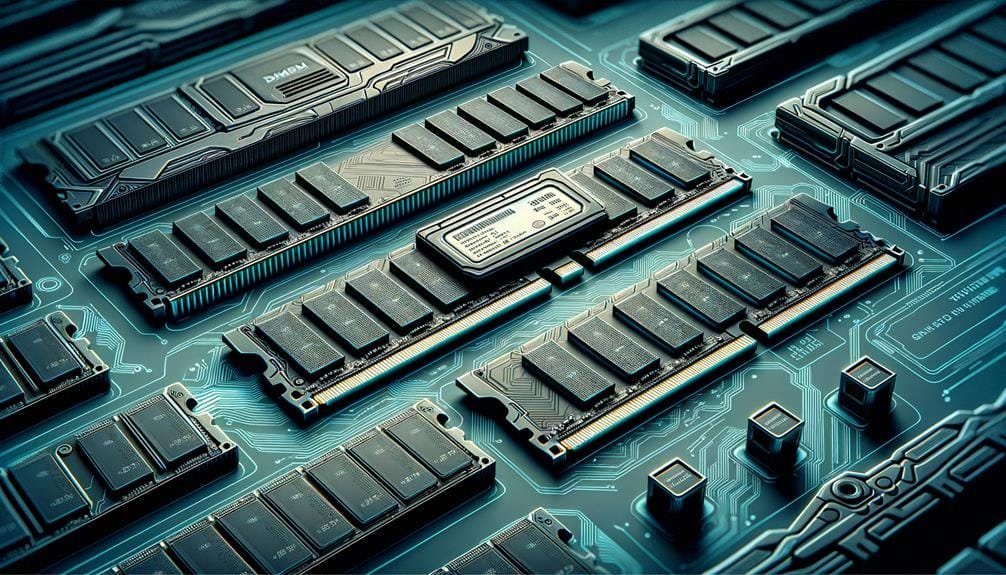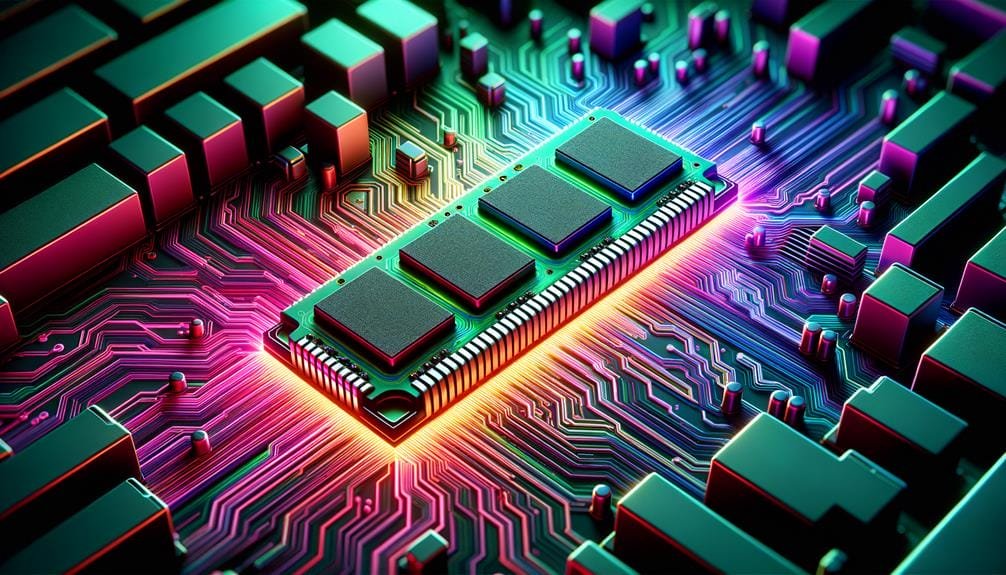Our Newsletter
Sign up for our e-mail newsletter and stay informed for what’s next on the horizon.
In the process of setting up our gaming systems, we sometimes underestimate the value of a key component: The RAM. We’re not implying that you’re compromising your machine’s capabilities, instead, we’re hinting that the appropriate RAM can shift the gaming experience significantly.
Selecting the ideal RAM goes beyond just capacity; aspects like velocity, compatibility, and setup are just as crucial. Feeling confused by this maze of gigabytes and pace ratings? Stick with us as we demystify gaming RAM in the following section.
Thus, we’ve journeyed through the complex cosmos of gaming RAM, akin to brave voyagers navigating a challenging maze.
We’ve decoded unclear specifications, tackled the challenges of compatibility, and understood the importance of RAM speed.
Keep in mind, your gaming setup is your stronghold, and RAM, its potent armament. Choose wisely, harness its power, and enjoy a superior gaming experience.
This guide is your navigational chart, leading you to the dominion of top-tier gaming computer RAM options.
So, what’s the role of RAM in a gaming computer, and why is it so vital for top-tier performance? In simple terms, RAM, standing for Random Access Memory, is a volatile memory that temporarily holds data for speedy access during gaming sessions. It functions like the brain’s short-term memory, keeping only necessary data for immediate processing. This temporary storage paves the way for the swift retrieval of data, improving frame rates and enriching the whole gaming experience.
The speed and capacity of RAM have a direct effect on gaming performance. Different generations of RAM, such as DDR4 and DDR5, offer diverse speeds and capacities to cater to our gaming requirements. For example, DDR4 provides lower latency and higher speed compared to its predecessors. On the other hand, DDR5 promises even faster speeds and larger capacities, allowing us to stretch the boundaries of our gaming pursuits.
Upgrading RAM can remarkably heighten system responsiveness, decrease loading times, and boost our overall gaming performance. Comprehending this functionality isn’t just technical jargon; it’s vital knowledge for those of us desiring the liberty of ultimate gaming experiences. Therefore, RAM isn’t just about capacity; it’s about speed and performance as well.
Grasping the interoperability of RAM with motherboards is pivotal, as different motherboards accommodate diverse types of RAM, each with unique specifications. To guarantee optimal performance for your gaming PC, recognizing the limitations of your motherboard and aligning them with appropriate RAM is of utmost importance.
The compatibility of DDR4 or DDR5 is reliant on your motherboard’s specifics. Some motherboards may solely support DDR4, whereas others are equipped to handle the advanced DDR5. In plain terms, an incompatible RAM type won’t physically fit into your motherboard’s RAM slots.
Here are three primary factors to consider:

In the sphere of gaming PC configurations, understanding crucial RAM specifications such as capacity, speed, and compatibility is a vital step towards maximizing performance. Let’s inspect these specifications to empower you with the liberty of choice and wisdom.
RAM capacity, quantified in GB, governs your system’s data storage capabilities. An increase in capacity signifies your system can save and access more data instantly, avoiding lags during intense gaming marathons. However, capacity isn’t the sole factor.
RAM speed, quantified in MT/s, establishes the pace at which data retrieval and processing take place. Striking a balance between capacity and speed is imperative for optimal gaming performance.
Dissimilar RAM generations, DDR4 and DDR5, present varied performance levels. DDR5, being the newest, typically offers higher speed and capacity, but this doesn’t invariably make it the superior choice. Compatibility with your motherboard and processor is just as, if not more, significant. If the RAM isn’t compatible, it won’t function, or at worst, could harm your system.
Let’s go through the steps of determining your gaming RAM needs.
Taking into account factors like the necessary capacity and speed for your gaming setup’s peak performance is crucial.
From the suggested RAM capacity for gaming and simultaneous tasks to the velocity of RAM modules for uninterrupted gameplay, we’ll assist you in making a well-informed choice.
In the realm of gaming PCs, comprehending the significance of RAM is vital, especially for achieving quicker loading times and fluid gameplay. The size and velocity of your RAM can directly influence your system’s reactivity, improve performance, and facilitate effective multitasking.
Ample RAM enables the operation of multiple background apps without hampering your gaming experience.
Sufficient RAM velocity and size boost system reactivity, a key aspect for real-time gaming.
Evaluating your gaming RAM requirements helps you choose the appropriate memory size and speed for your PC, allowing you to optimize the performance.
Ultimately, grasping the role of RAM is fundamental to maximize your gaming PC’s capabilities and relish an unfettered gaming experience.
Recognizing the critical role of RAM in gaming computers, we’ll dissect the primary RAM specifications – storage, rate, and latency – to better evaluate our gaming requisites.
Storage, gauged in gigabytes, signifies the data storage at disposal. An increased storage implies that RAM can accommodate more data, improving gaming performance.
Rate, measured in megatransfers per second, controls the pace of data access. A superior rate guarantees faster data recovery, vital for peak performance.
Latency, in particular CAS latency, calculates the wait time between the receipt and execution of a command. Reduced latency translates to minimal delay, aiding in efficient operation.
Comprehending these specifications is pivotal in selecting the apt RAM for your gaming computer, as they directly affect its comprehensive performance.

We’re set to decipher the complexities of RAM speed, a crucial determinant in your gaming computer’s performance.
It’s not merely about having abundant RAM, it’s also about the swiftness with which that RAM can retrieve your data.
We’ll clarify why RAM speed is relevant, how to read speed specifications, and how to strike a balance between RAM capacity and speed for ideal gaming performance.
In the domain of video games, grasping the crucial elements of RAM speed, gauged in megatransfers per second (MT/s), is a vital step toward optimizing the effectiveness of a gaming PC. The speed of RAM directly influences data transfer rates, with superior speeds ameliorating system performance, and diminishing loading times, thus refining your gaming experience.
Overclocking can propel RAM speed past factory specifications, further contributing to performance refinement. It’s crucial to comprehend that:
Building on our insight into the role of RAM speed in gaming, we are going to scrutinize the details of RAM speed specifications. Key to maximizing performance, comprehending these specs can notably uplift your gaming experience.
| Factor | Explanation |
|---|---|
| RAM Speeds (MT/s) | Greater speeds such as DDR4-3600 signify faster data access, improving system performance. |
| CAS Latency | This delay in RAM response affects speed and total performance. Lower CAS latency indicates swifter response times. |
| Overclocking RAM | This procedure can increase speed beyond default specifications but might necessitate voltage and timing modifications. |
| DDR4 RAM | A variant of RAM with greater speeds, ameliorating gaming performance. |
Choosing the appropriate RAM for your gaming PC isn’t just about opting for the one with the most capacity; it’s a combination of capacity, speed, and compatibility for best performance and seamless multitasking. Let’s disassemble it:
Picking the right RAM is a crucial procedure in constructing or upgrading your gaming PC. It’s not just a matter of numbers; it’s about coordinating capacity, speed, and compatibility to maximize your system. With the suitable RAM, your gaming experiences will be smoother, quicker, and more engaging.
So, we’ve traveled through the intricate universe of gaming RAM, much like courageous explorers making their way through a tough labyrinth.
We’ve interpreted vague specifications, faced the monsters of compatibility, and learned the significance of RAM speed.
Keep in mind, your gaming setup is your fortress, and RAM, its powerful weapon. Choose carefully, utilize its strength, and relish in an unparalleled gaming experience.
This guide is your treasure map, directing you to the kingdom of top gaming computer RAM choices.
Our suggestion would be to take into account RAM capacity, speed, and system compatibility when making your choice. It’s recommended to select at least 16GB, with high speeds such as DDR4-3600, and make sure it’s compatible with your motherboard and CPU. In addition, having a lower CAS latency can be advantageous.
We’d advise investing in 16GB to 32GB of RAM for your gaming system. It’ll ensure fluid gameplay, swift load times, and the capacity for multitasking. Don’t cut corners, folks – your gaming experience will appreciate it.
It’s fair to suggest that for the average gamer, 32GB RAM might seem excessive. A significant number of games don’t fully exploit that amount of RAM. Before deciding to acquire 32GB of RAM, it would be practical to assess your individual requirements.
“Starting with 16GB of DDR5 RAM for gaming is our suggestion. It strikes a balance between effective performance and reasonable cost. However, for those considering long-term use, 32GB is not excessive. Don’t forget to verify the compatibility with your motherboard.”
Sign up for our e-mail newsletter and stay informed for what’s next on the horizon.